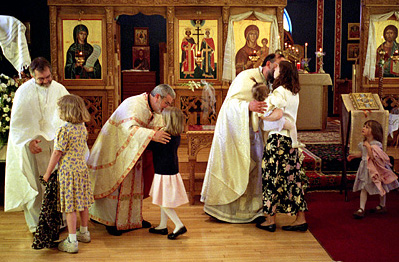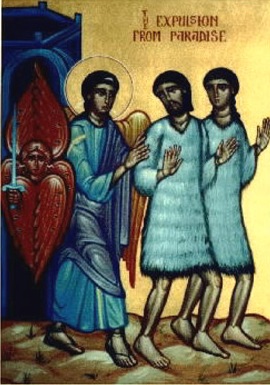On the same day, we commemorate
the banishment of Adam, the First-formed man, from the Paradise
of delight.
Our Holy Fathers appointed this commemoration
before the Holy Fast, as if to show in actual fact how beneficial the medicine
of fasting is to human nature, and also how great is the shame of gluttony and
disobedience. Passing over all the individual sins committed in the world on
account of him, as being without number, the Fathers set forth how much evil
Adam, the first-formed man, suffered from not fasting even for a brief time, and
how much evil he thereby brought upon our race, clearly pointing out also that
the virtue of fasting was the first commandment that God gave to mankind.
Not keeping this commandment, but yielding to
his belly, or rather, through Eve, to the deceitful serpent, Adam not only did
not become God, but also incurred death and transmitted corruption to the whole
human race.
Because of the self-indulgence of the first
Adam, the Lord fasted for forty days and was obedient. For this reason, the
present Holy Fast was designed by the Holy Apostles, in order that we might
enjoy incorruption, through fasting, by keeping the commandment which he did not
keep, thereby suffering the loss of incorruption. Furthermore, as we said
previously, the aim of the Saints is to encompass in brief the works wrought by
God from the beginning to the end. Since Adam’s transgression and his expulsion
from the Paradise of delight were the cause of all our woes, for this reason
they now set this transgression before us, so that, remembering it, we might
avoid it and not in any way emulate his incontinence.
On this day, after Vespers – after hearing the
announcement of Lent in the Great Prokeimenon: "Turn not away Thy face from Thy
child for I am afflicted! Hear me speedily! Draw near unto my soul and deliver
it!", after making our entrance into Lenten worship, with its special memories,
with the prayer of St. Ephraim the Syrian, with its prostrations – we ask
forgiveness from each other, we perform the rite of forgiveness and
reconciliation.

